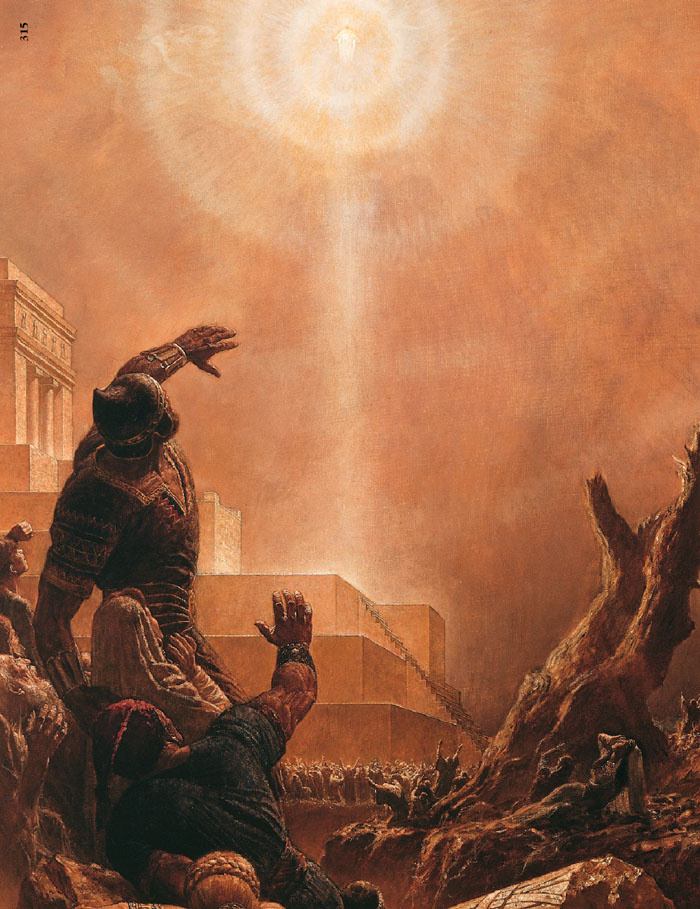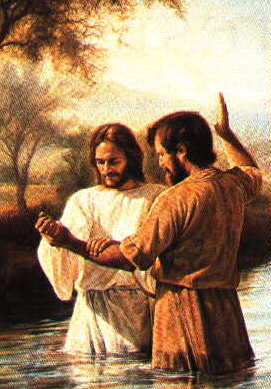|
|
|
|
 CHAPTER 3
CHAPTER 3John the Baptist preaches in Judaea—Jesus is baptized and the Father acclaims him as his Beloved Son. |
||
|
1 IN those days came
aJohn the Baptist, preaching in the wilderness of Judaea,
2 And saying, aRepent ye: for the bkingdom of heaven cis at hand. 3 For this is he that was spoken of by the prophet aEsaias [Isaiah], saying, The bvoice of one crying in the wilderness, cPrepare ye the way of the Lord, make his dpaths straighta.
 I've always liked the Arnold Frieburg conception
of Christ's appearance to the Nephites. Whether intentional or not, the
straight beam of light descending from the Lord in the sky reminds one of the
'striaght highway', 'way' or 'path' spoken of by Isaiah (Isaiah 40:3) and
quoted in all four gospels and referenced in the Doctrine and Covenants. It
also recalls Lehi's dream of the striaght and narrow path which leads to the
tree of life which is a representation of God's Love and the atonement of
Christ.
I've always liked the Arnold Frieburg conception
of Christ's appearance to the Nephites. Whether intentional or not, the
straight beam of light descending from the Lord in the sky reminds one of the
'striaght highway', 'way' or 'path' spoken of by Isaiah (Isaiah 40:3) and
quoted in all four gospels and referenced in the Doctrine and Covenants. It
also recalls Lehi's dream of the striaght and narrow path which leads to the
tree of life which is a representation of God's Love and the atonement of
Christ.
|
3a make his paths straight Here and in Matthew and in Mark and Luke the word 'paths' is plural, but in Isaiah and in John it is singlular. In the KJV Isaiah, as well as the JST, the word is 'way' but an added note also uses the singular 'highway' and the connotation is not necessarily the path for man but the way for the Lord. In John it is also singular being 'way' and though it is not necessarily exactly as in Isaiah, it is consistant with the KJV Old Testament version in that it is 'the way of the Lord'. What happens between Matthew, Mark and Luke is that often they parallel each other to the extent that it may well be considered that in part their consistancy is because one account has influenced each of the others. Also D&C 65:3 is also consistant with the singluar form in the 'way of the Lord'. Furter it is consistant with doctrine, that there is only one way of the Lord and his path is a straight course. Thus the most reliable translation must be consistant to be the singular and Matthew, Mark and Luke may be well adapted to this consideration by changing 'paths' to 'path'. And thus the 'way of the Lord', his course also become the strait and narrow path which leads to God's Kingdom. |
1a
D&C 128:20; 2a Mark 9:2 (2-13); Luke 9:29 (28-36); John 1:14; 2 Pet. 1:16 (16-19); TG Jesus Christ, Glory of; |
|
4 And the same John had his araiment
of bcamel's hair, and a leathern girdle about his loins;
and his meat was clocusts and wild honey.
|
1a
D&C 128:20; 2a Mark 9:2 (2-13); Luke 9:29 (28-36); John 1:14; 2 Pet. 1:16 (16-19); TG Jesus Christ, Glory of; |
|
|
5 Then went out to him Jerusalem, and all Judaea, and
all the region round about Jordan,
6 And were baptized of him in Jordan, aconfessing their sins. |
1a
D&C 128:20; 2a Mark 9:2 (2-13); Luke 9:29 (28-36); John 1:14; 2 Pet. 1:16 (16-19); TG Jesus Christ, Glory of; |
|
7 ¶ But when he saw many of the Pharisees and
Sadducees come to his abaptism, he said unto them, O
bgeneration of vipers, who hath cwarned
you to flee from the wrath to dcome?
 9 And think not to say within yourselves, We have Abraham ato our father: for I say unto you, that God is able of these stonesa to raise up children unto Abraham. |
9a these stones While it is colorful and lively metaphor and an interesting allusion to actual 'stones' being made men, it is more likely that it is the Gentiles, whom John here refers to as the Jews considered them to be no more than 'stones' than fellow children of God and 'sons' of Abraham that is being referred to here (see Luke 3:8 & Luke 19:40). And therein lies a deeper gospel doctrinal principle, and that is that all through the Everlasting Covenant, the Gospel of Jesus Christ, if they but come unto it, will be made a part of the covenant through the ordinances and merits of Christ. And thus not only all may become as the children of Abraham, that is to be included as the children of the covenant, but also all will become a part of the House of Israel who so come unto Christ and become a part of his kingdom, whether past, present or future; all mankind may 'prevail in God' and become heirs of the kingdom, that is of Israel. And this is the great offering we have to give unto the world today. We but say unto them, 'Come and become a part of Israel and of the House of God in receiving of the Everlasting Covenant of the Father through the Doctrine of the Son. Come and become children of Abraham, children of Jacob and of Eprhaim, even Children of God as sons and daughters of Christ.' | |
|
10 And now also the axe is laid unto the root of the
trees: therefore every tree which abringeth not forth good
fruit is bhewn down, and cast into the fire.
11 aI indeed bbaptize you with water unto crepentance: but he that cometh after me is mightier than I, whose shoes I am not dworthy to bear: he shall ebaptize you with the Holy Ghost, and with ffire: 12 Whose afan is in his hand, and he will throughly purge his floor, and gather his wheat into the bgarner; but he will burn up the chaff with unquenchable cfire. |
||
|
13 ¶ Then cometh Jesus from Galilee to Jordan
unto John, to be abaptized of him.
14 But John forbad him, saying, I have need to be baptized of thee, and comest thou to me? 15 And Jesus answering said unto him, aSuffer it to be so now: for thus it bbecometh us to cfulfil all drighteousness. Then he suffered him. |
||
|
16 And Jesus, when he was
abaptized, went up bstraightway out of
the water: and, lo, the heavens were opened unto him, and he saw the
cSpirit of God descending like a ddove,
and lighting upon him:
17 And lo a avoice from heaven, saying, This is my bbeloved cSon, in whom I am well pleased. |
||